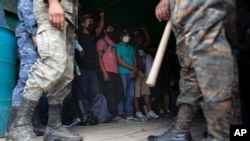Guatemalan authorities said Saturday they have disbanded a caravan of migrants heading north from Honduras, bound for the U.S. border, sending more than 3,000 back home over the past few days.
Since Thursday, when thousands of migrants began crossing into Guatemala without permission, authorities said most had “opted to return” and were sent back to Honduras on buses.
The caravan had split into two groups Friday, with one headed for the Peten region of northern Guatemala, and the other for the Mexican border city of Tapachula.
The group headed for northern Guatemala ran into a roadblock manned by police and soldiers, where so many of their fellow migrants were turned around.
A few small groups of migrants could still be seen walking along the highway Saturday morning.
Olvin Suazo, 21, and three friends, all farm workers in their early 20s from Santa Barbara, Honduras, said they would continue north.
Guatemalan Vice Minister of Foreign Relations Eduardo Sanchez called on Honduras to stop such large groups of migrants, calling them a health risk amid the pandemic.
The migrants are headed to the U.S. because of poverty exacerbated by widespread job losses sparked by the pandemic in Latin America.
Their journey came two years after a caravan that formed shortly before the U.S. midterm elections and became a campaign issue. Those migrants initially received support from communities along the way, particularly in southern Mexico.
But Mexico deployed National Guard troops and immigration agents to intercept large groups of migrants after U.S. President Donald Trump, who is seeking reelection, threatened tariffs on Mexican imports if it did not stem the flow of migrants to the U.S. border.
Mexico's migration authority chief Francisco Garduno said this week the government would deploy hundreds of military and immigration personnel to its border to prevent the caravan from entering the country.
Mexican President Lopez Obrador suggested the caravan was associated with the November 3 U.S. presidential election.
“It has to do with the election in the United States,” Obrador told reporters. “I don’t have all the elements, but I think there are indications that it was put together for this purpose. I don’t know to whose benefit, but we’re not naive.”
The Trump administration said Thursday it would admit a record low 15,000 refugees during the coming year.
Democratic presidential candidate Joe Biden has vowed to raise the refugee cap to 125,000, saying accepting persecuted people is consistent with American values.





